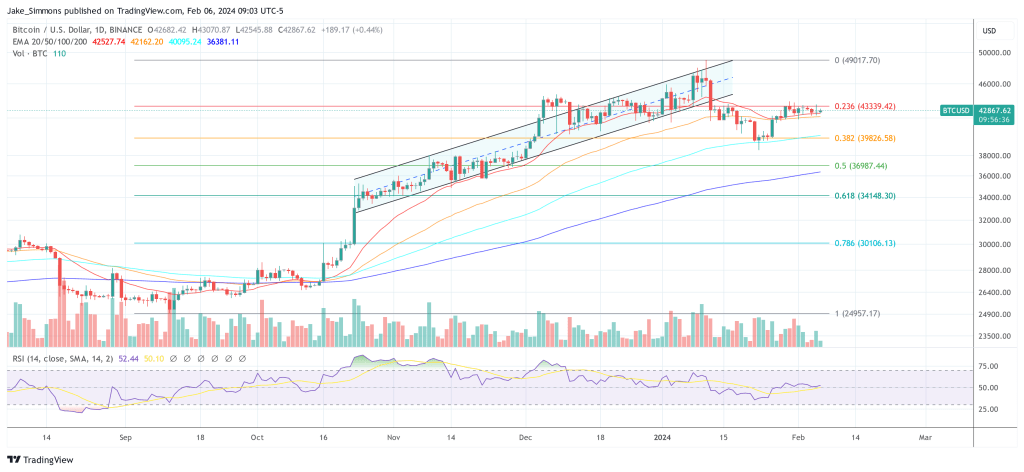In a series of statements on X, Brian Morgenstern, Head of Public Policy at Riot Platforms Inc, the second-largest Bitcoin miner in the United States by market capitalization, has openly criticized the US Energy Information Administration’s (EIA) new mandate to collect data on energy usage by miners. This directive, which stems from a White House initiative, is part of a broader effort to understand the growing electricity demands and environmental impacts of the Bitcoin mining industry.
A Political Ploy Against Bitcoin
Morgenstern’s remarks suggest a deep-seated belief that the directive is less about environmental concern and more a politically motivated attack on the Bitcoin and crypto sector. Via X, he argues that the mandate is an indirect result of recommendations from the White House Office of Science and Technology Policy and a group of Senators, prominently including Senator Warren, known for her critical stance on crypto.
He cites the official document, which states: “With respect to EIA, both the White House Office of Science and Technology Policy and a group of Senators, led by Senator Warren, have recommended that EIA collect energy-relevant data on US crypto mining activity.”
Addressing the environmental impact, Morgenstern clarifies a common misperception about Bitcoin mining, stating that Bitcoin miners don’t directly emit carbon; “they are electricity consumers, akin to electric vehicles.” This statement is aimed at distinguishing the electricity consumption from direct carbon emissions, a point often blurred in public discourse.
There’s no emergency & this has nothing to do with transparency. Bitcoin miners are one of the most transparent industries in the world. The data shows miners enhance grid stability & have a negative correlation with grid stress.
Morgenstern also highlights the transparency of the Bitcoin mining industry, contradicting the EIA’s implication of opaqueness. He asserts that the industry not only operates transparently but also contributes positively to the stability of the power grid. This point counters the EIA’s suggestion that crypto mining poses a risk to grid stability.
A significant part of Morgenstern’s criticism is directed towards the perceived invasion of privacy and the publicizing of sensitive business information. He contends that the directive serves to expose private business data to groups with an agenda against the crypto mining industry, facilitating targeted attacks.
Operation Chokepoint 3.0?
Furthermore, Morgenstern extends his critique to the broader Biden administration’s policy towards Bitcoin. He suggests a government bias favoring a Central Bank Digital Currency (CBDC), positing that this bias is linked to a desire for greater control over financial transactions. This stance, he argues, is symptomatic of a larger governmental inclination to regulate and potentially suppress the Bitcoin and sector.
The White House said the quiet part out loud in Sept. ’22 by signaling a desire “to limit or eliminate” Bitcoin mining,” he remarked, citing a document which reveals the true agenda. […] Now they want Bitcoin miners to dox their power providers so the Dept. of ENERGY can tell them to stop working together. Operation Chokepoint 3.0?
Notably, the White House proposed in September 2022 that the Administration should “explore executive actions, and Congress might consider legislation, to limit or eliminate the use of high energy intensity consensus mechanisms for crypto-asset mining.”
Morgenstern also raises legal and constitutional concerns, suggesting that the EIA’s directive may violate several legal principles. “Other attorneys may have views, but it strikes me as potential violations of administrative procedure, paperwork reduction act, illegally compelled speech (1st Amend. means-ends, burdensome), due process (notice, penalties), & major questions doctrine (WV v. EPA).”
He connects these potential violations to broader actions by the administration, such as the SEC’s approach to crypto regulation, which he characterizes as “regulation by enforcement.” He concluded:
How can we forget that The White House proposed a THIRTY PERCENT tax on electricity use by specific users, while saying they want to increase access to … electricity … for all Americans?!?! I feel like I’m taking crazy pills.
At press time, BTC traded at $42,867.

by Jake Simmons via Bitcoinist.com
Comments
Post a Comment